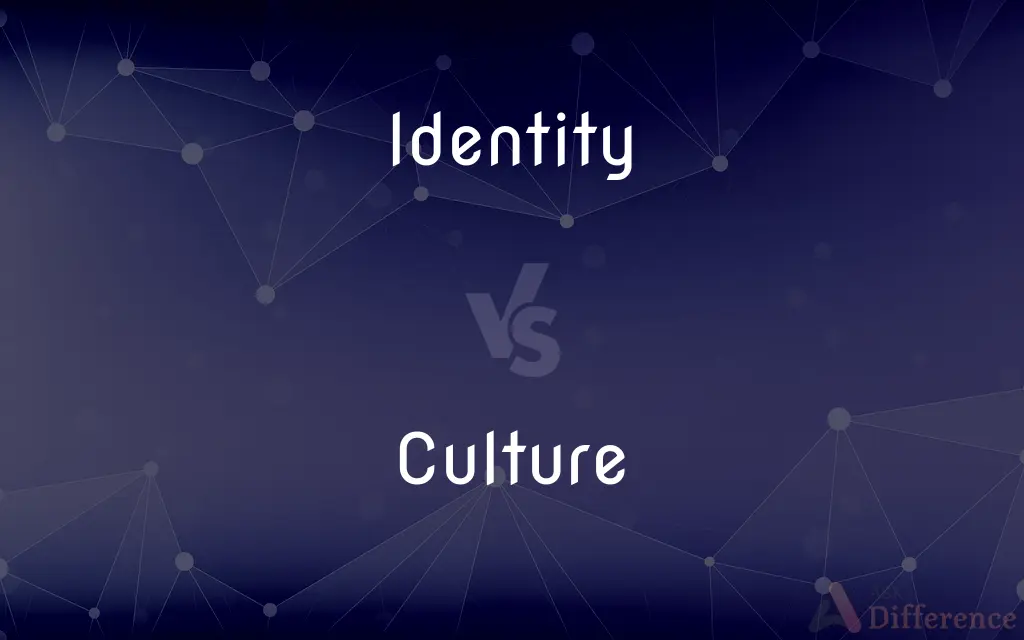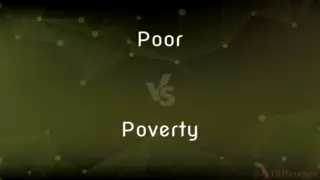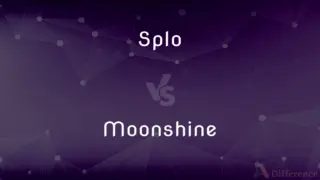Identity vs. Culture — What's the Difference?

Difference Between Identity and Culture
ADVERTISEMENT
Compare with Definitions
Identity
The fact of being who or what a person or thing is
She believes she is the victim of mistaken identity
He knows the identity of the bombers
Culture
Culture () is an umbrella term which encompasses the social behavior and norms found in human societies, as well as the knowledge, beliefs, arts, laws, customs, capabilities, and habits of the individuals in these groups.Humans acquire culture through the learning processes of enculturation and socialization, which is shown by the diversity of cultures across societies. A cultural norm codifies acceptable conduct in society; it serves as a guideline for behavior, dress, language, and demeanor in a situation, which serves as a template for expectations in a social group.
Identity
A close similarity or affinity
An identity between the company's own interests and those of the local community
Culture
The arts, beliefs, customs, institutions, and other products of human work and thought considered as a unit, especially with regard to a particular time or social group
Edwardian culture.
Japanese culture.
Identity
A transformation that leaves an object unchanged.
ADVERTISEMENT
Culture
These arts, beliefs, and other products considered with respect to a particular subject or mode of expression
Musical culture.
Oral culture.
Identity
The equality of two expressions for all values of the quantities expressed by letters, or an equation expressing this, e.g. (x + 1)² = x² + 2x + 1.
Culture
The set of predominating attitudes and behavior that characterize a group or organization
A manager who changed the corporate culture.
Identity
The condition of being a certain person or thing
What is the identity of the author of the manuscript?.
Culture
Mental refinement and sophisticated taste resulting from the appreciation of the arts and sciences
A woman of great culture.
Identity
The set of characteristics by which a person or thing is definitively recognizable or known
"The identity of the nation had ... been keenly contested in the period of nationalist opposition to Imperial rule" (Judith M. Brown).
Culture
Special training and development
Voice culture for singers and actors.
Identity
The awareness that an individual or group has of being a distinct, persisting entity
"He felt more at home thousands of miles from Britain than he did in an English village four miles from his home ... Was he losing his identity?" (Robert Fallon).
Culture
The cultivation of soil; tillage
The culture of the soil.
Identity
The fact or condition of being the same as something else
The identity of the two handwriting samples was established by an expert.
Culture
The breeding or cultivation of animals or plants for food, the improvement of stock, or other purposes.
Identity
The fact or condition of being associated or affiliated with something else
The identity between mass and energy.
Culture
The growing of microorganisms, tissue cells, or other living matter in a specially prepared nutrient medium.
Identity
Information, such as an identification number, used to establish or prove a person's individuality, as in providing access to a credit account.
Culture
Such a growth or colony, as of bacteria.
Identity
An equation that is satisfied by any number that replaces the letter for which the equation is defined.
Culture
To cultivate (soil or plants).
Identity
Identity element.
Culture
To grow (microorganisms or other living matter) in a specially prepared nutrient medium.
Identity
Sameness, identicalness; the quality or fact of (several specified things) being the same.
Culture
To use (a substance) as a medium for culture
Culture milk.
Identity
The difference or character that marks off an individual or collective from the rest of the same kind, selfhood, sense of who something or someone or oneself is, or the recurring characteristics that enable the recognition of such an individual or group by others or themself.
I've been through so many changes, I have no sense of identity.
This nation has a strong identity.
Culture
The arts, customs, lifestyles, background, and habits that characterize humankind, or a particular society or nation.
Identity
A name or persona—a mask or appearance one presents to the world—by which one is known.
This criminal has taken on several identities.
In this show, the competitor's identity will remain secret until after the vote.
Culture
The beliefs, values, behaviour and material objects that constitute a people's way of life.
Identity
(mathematics) An equation which always holds true regardless of the choice of input variables.
The equation (x+y)(x−y) = x2−y2 is an algebraic identity. It is true regardless of the values of x and y.
Culture
The conventional conducts and ideologies of a community; the system comprising the accepted norms and values of a society.
Identity
Any function which maps all elements of its domain to themselves.
Culture
(anthropology) Any knowledge passed from one generation to the next, not necessarily with respect to human beings.
Identity
(algebra) An element of an algebraic structure which, when applied to another element under an operation in that structure, yields this second element.
Culture
(botany) Cultivation.
Identity
A well-known or famous person.
Culture
(microbiology) The process of growing a bacterial or other biological entity in an artificial medium.
Identity
The state or quality of being identical, or the same; sameness.
Identity is a relation between our cognitions of a thing, not between things themselves.
Culture
The growth thus produced.
I'm headed to the lab to make sure my cell culture hasn't died.
Identity
The condition of being the same with something described or asserted, or of possessing a character claimed; as, to establish the identity of stolen goods.
Culture
A group of bacteria.
Identity
An identical equation.
Culture
(cartography) The details on a map that do not represent natural features of the area delineated, such as names and the symbols for towns, roads, meridians, and parallels.
Identity
The distinct personality of an individual regarded as a persisting entity;
You can lose your identity when you join the army
Culture
(archaeology) A recurring assemblage of artifacts from a specific time and place that may constitute the material culture remains of a particular past human society.
Identity
The individual characteristics by which a thing or person is recognized or known;
Geneticists only recently discovered the identity of the gene that causes it
It was too dark to determine his identity
She guessed the identity of his lover
Culture
(euphemism) Ethnicity, race (and its associated arts, customs, etc.)
Identity
An operator that leaves unchanged the element on which it operates;
The identity under numerical multiplication is 1
Culture
(transitive) to maintain in an environment suitable for growth especially of bacteria cultivate}}
Identity
Exact sameness;
They shared an identity of interests
Culture
(transitive) to increase the artistic or scientific interest in something cultivate}}
Culture
The act or practice of cultivating, or of preparing the earth for seed and raising crops by tillage; as, the culture of the soil.
Culture
The act of, or any labor or means employed for, training, disciplining, or refining the moral and intellectual nature of man; as, the culture of the mind.
If vain our toilWe ought to blame the culture, not the soil.
Culture
The state of being cultivated; result of cultivation; physical improvement; enlightenment and discipline acquired by mental and moral training; civilization; refinement in manners and taste.
What the Greeks expressed by their paidei`a, the Romans by their humanitas, we less happily try to express by the more artificial word culture.
The list of all the items of the general life of a people represents that whole which we call its culture.
Culture
The cultivation of bacteria or other organisms (such as fungi or eukaryotic cells from mulitcellular organisms) in artificial media or under artificial conditions.
Culture
Those details of a map, collectively, which do not represent natural features of the area delineated, as names and the symbols for towns, roads, houses, bridges, meridians, and parallels.
Culture
To cultivate; to educate.
They came . . . into places well inhabited and cultured.
Culture
A particular society at a particular time and place;
Early Mayan civilization
Culture
The tastes in art and manners that are favored by a social group
Culture
All the knowledge and values shared by a society
Culture
(biology) the growing of microorganisms in a nutrient medium (such as gelatin or agar);
The culture of cells in a Petri dish
Culture
(bacteriology) the product of cultivating micro-organisms in a nutrient medium
Culture
A highly developed state of perfection; having a flawless or impeccable quality;
They performed with great polish
I admired the exquisite refinement of his prose
Almost an inspiration which gives to all work that finish which is almost art
Culture
The attitudes and behavior that are characteristic of a particular social group or organization;
The developing drug culture
The reason that the agency is doomed to inaction has something to do with the FBI culture
Culture
The raising of plants or animals;
The culture of oysters
Share Your Discovery

Previous Comparison
Poor vs. Poverty
Next Comparison
Splo vs. Moonshine













































